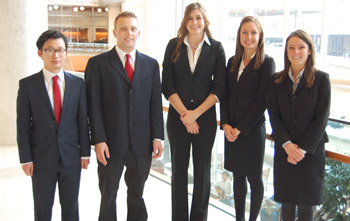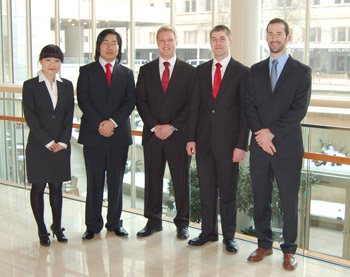Mayo Scholars
Interdisciplinary program provides research opportunities
April 15, 2013
By Michael Hemmesch '97

From left: Yifei Huang, Alex Hanson, Katherine Nystrom, Arianna Stotz and Samantha Majkowski

From left: Yixi Chen, Runbo Xu, Adam Sperl, Josh St. George and Daniel Kolar
Eight students at the College of Saint Benedict and Saint John's University recently concluded their participation in the Mayo Innovation Scholars Program (MISP), an experiential learning program offered through Mayo Clinic.
The interdisciplinary program provides research opportunities to teams of undergraduates from Minnesota private colleges, under the guidance of select graduate students.
The CSB and SJU students worked on two projects on campus throughout the 2012-13 academic year, and presented their findings in March at Mayo Clinic in Rochester, Minn., and in a written report. On average, each student put in roughly 150 hours of work during the program.
CSB senior accounting major Yixi Chen (Luzhou, China), SJU senior biology major Adam Sperl (St. Cloud, Minn.), SJU senior humanities and classical languages double major Josh St. George (Falcon Heights, Minn.) and SJU senior applied physics and computer science double major Runbo Xu (Zhengzhou, China) presented research on a project dealing with surgical training and competency assessments. The students worked on the project with the Mayo Multidisciplinary Simulation Center.
SJU junior integrative health sciences major Alex Hanson (Sartell, Minn.), CSB senior bio-chemistry major Katherine Nystrom (Milaca, Minn.), CSB junior economics and management double major Arianna Stotz (Plymouth, Minn.) and SJU senior accounting major Yifei Huang (Chengdu, China) presented research on a project dealing with Neuromyelitis Optica, an autoimmune disease affecting the optic nerve. The students worked on the project with Mayo Clinic Ventures.
They were supported by Daniel Kolar and Samantha Majkowski, current MBA students at the University of St. Thomas. Lisa Lindgren, associate professor of global business leadership at CSB and SJU; Jennifer Schaefer, assistant professor of biology at CSB and SJU; and J. Andrew Holey, professor of computer science at CSB and SJU, served as project advisers. Laura Hammond, assistant director of experiential learning and community engagement at CSB and SJU, provided administrative support.
"I was impressed with the way our students engaged with a challenging project and with each other," Schaefer said. "They were given a task that would be difficult for many professionals and were able to work together to determine goals and troubleshoot problems in order to produce a high-quality report for Mayo Clinic."
"A key part of the project is learning how to deal with ambiguity," Kolar said. "The students were given concepts/ideas and given access to experts in the field, but there is no outline and very few right or wrong answers to the questions that arose. The students were forced to really engage in the granular details of the project and developed an evidence-based recommendation. These students engaged it, wrestled with it and became experts."
MISP aims to assist Mayo Clinic in the assessment of new product submissions by Mayo researchers, provide research opportunities for undergraduate science and business students and provide leadership development and research opportunities for MBA students.
"The students who participate in this program are offered the incredible opportunity to work on a real-world problem of assessing the scientific and market potential of an actual invention or product idea," Lindgren said. "In addition, they learn how to work together as an interdisciplinary team, a skill that is necessary in any field in the 21st century."
The program was designed in 2006 by John Meslow, a retired Medtronic executive. Together with Mayo Clinic Ventures and the Minnesota Private College Council (MPCC), Meslow created a unique program to place students from a variety of disciplines at the interface of innovations in science and medicine and the fields of intellectual property, marketing and business development.
Staff members from Mayo Clinic were impressed by the quality of the students' work, saying the students did a tremendous job researching cutting-edge material.
After the presentation, the students described their experience and its benefits.
"The Mayo Innovation Scholars Program offered an opportunity to collaborate with a world-renowned health-care organization on a project that uniquely incorporated health care, science and business knowledge to analyze real-world innovations," Sperl said. "My involvement in this program refined my research and presentation skills, improved my ability to work in an interdisciplinary team and further developed my ability to critically evaluate innovative concepts and products."
The students also spoke highly of the program's interdisciplinary approach.
"Another valuable experience I had in the MISP was having the opportunity to work in an interdisciplinary team," Nystrom said. "The field of health care and public health is constantly changing, and the ability to recognize and understand other aspects of the field, such as business and economics, will be imperative for the growth and betterment of health care. This program is the epitome of experiential learning. Not only did my experience in the MISP give me a real world opportunity to essentially get my feet wet in the business of health care innovation, but it also has influenced my career plans."
"As an aspiring academic, MISP opened my eyes more clearly to the benefits and need in today's world to be able to think not only academically about a problem, but also commercially," St. George said. "MISP also made it even more clear in my mind that multi-disciplinary approaches to problem solving are in many ways the most beneficial to the success of the proposed solutions. People trained to do different things think about the world in different ways. By collaborating with others, those different world views are addressed and assessed, and the solution is the better for it."
In total, there were 12 presentations over two days by 10 MPCC member institutions.
Now in its seventh year, MISP continues to be an innovative model for student experiential learning. Financial support for MISP is provided by the Medtronic Foundation. Additional funding and support comes from Mayo Clinic and MPCC.
